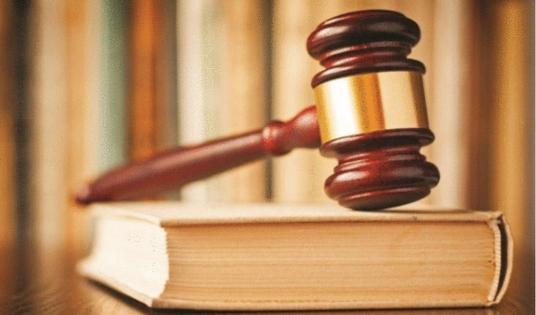Editorial: Trump's Florida judicial picks spur doubts
Published in Political News
When the U.S. Senate considers five Floridians who are up for federal judgeships, three of them should be forced to answer a familiar Washington question: What did you know and when did you know it?
Ed Artau and Jordan Pratt are Florida appellate judges who recently wrote opinions sure to please President Donald Trump, who announced their nominations last week.
It would impugn their fitness to be federal judges if they knew at the time that Trump was considering them for the federal bench. Their generally hard-right leanings are an issue, too, casting additional doubt on whether either of them should be confirmed by the Senate.
Trump’s third Florida nominee, John Guard, is chief deputy state attorney general. He signed off on the $67 million Medicaid settlement that earmarked $10 million to First Lady Casey DeSantis’ Hope Florida Foundation. The money apparently flowed through to a political committee helping Gov. Ron DeSantis defeat the recreational-marijuana amendment last November.
Questions persist
State Attorney Jack Campbell in Tallahassee has begun a criminal investigation into the diversion of that money, and Sen. Rick Scott has said that Guard should have to answer “some questions” about it. Some obvious ones: Did he know where the money would go? Was it an appropriation that only the Legislature should have made?
Scott isn’t on the Senate Judiciary Committee, but Florida’s other senator, Ashley Moody, is. Because Moody was Guard’s boss when he signed off on the settlement, she should disqualify herself from voting on his nomination.
Artau, a judge of the Fourth District Court of Appeal, flagrantly flattered Trump’s cause when the court ruled in February that he could continue suing non-Floridians on the Pulitzer Prize Board in a state court.
Trump claims they defamed him by awarding prizes to the Washington Post and the New York Times for their coverage of alleged Russian interference in the 2020 election. From a First Amendment standpoint, the suit is preposterous.
The main opinion of a three-judge panel gave a simple “yes” to that jurisdictional question and did not go into the main issue of whether the Pulitzer board had libeled Trump.
As if Trump wrote it
Artau’s concurring opinion reads as if Trump wrote it. It quoted Trump’s claim that it was all “fake news,” a “phony witch hunt” and “a big hoax.” The rest of the 12 pages — six times as long as the opinion — was pro-Trump, too.
Artau has not replied to our email asking if he knew Trump was considering him for a federal judgeship when he wrote that opinion. The public deserves to know.
Artau wrote that the U.S. Supreme Court should reconsider New York Times v. Sullivan, the landmark case that raised the standard for defamation lawsuits by public officials. Trump and his lawyers have repeatedly made the same argument.
In an earlier, unrelated case, Artau dissented from a majority opinion overturning the resisting-arrest conviction of a woman who had been photographing Trump’s Mar-a-Lago resort.
Pratt, a judge of the Fifth District Court of Appeal at Daytona Beach, wrote the opinion last month striking down the Florida law allowing minors to obtain a judge’s permission for an abortion rather than to have to notify their parents and obtain their consent.
A far-fetched theory
His opinion for a unanimous panel embraced a far-fetched legal theory that the 14th Amendment gives parents an inherent right to be informed and to consent.
The other Floridians whom Trump is nominating are Judge Anne-Leigh Gaylord Moe of Florida’s Second District Court of Appeal and Kyle Dudek, a federal magistrate judge in Fort Myers.
All the nominees except Dudek are known members of the Federalist Society, a conservative legal organization that has had extraordinary influence in judicial appointments by Trump as well as DeSantis. Artau flaunted his Federalist ties when he unsuccessfully sought a Florida Supreme Court appointment from DeSantis.
On shaky ground
The society’s standing with Trump would appear to be shaky now in light of the tantrum the president pitched last week over a three-judge federal court’s ruling against his tariffs. That outburst came just after he had announced the five Florida nominations.
And it was over the top, even for Trump, in that he didn’t assail just the ruling but denounced Leonard Leo, former executive vice president of the Federalist Society, and the group itself for “bad advice they gave me on numerous legal occasions.”
The outburst was likely just another attempt to intimidate federal judges into treating him as deferentially as the Republican Congress does. Nevertheless, there’s great danger in his reckless jawboning.
It is evident in a surge of threats against federal judges and their families. A total of 373 were investigated by the U.S. Marshals Service in just the first five months of this year, compared to 509 all last year. There have also been more than 100 unsolicited pizza deliveries, a menacing way of saying “We know where you live.”
If any judge or family member is harmed, the world will know who incited it.
____
The Sun Sentinel Editorial Board consists of Opinion Editor Steve Bousquet, Deputy Opinion Editor Dan Sweeney, editorial writers Pat Beall and Martin Dyckman, and Executive Editor Gretchen Day-Bryant. To contact us, email at letters@sun-sentinel.com.
___
©2025 South Florida Sun Sentinel. Visit at sun-sentinel.com. Distributed by Tribune Content Agency, LLC.

























































Comments